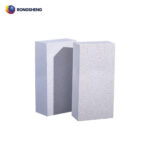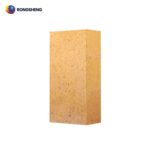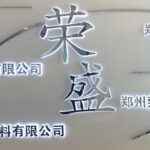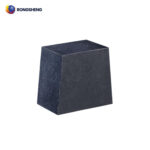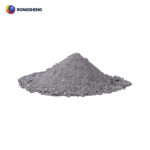
Basic Refractory Bricks
- Magnesium bricks, MgO≥80%.
- Magnesium-chrome bricks, 55≤MgO<80%.
- Chrome-magnesium bricks, 25%≤MgO<55%.
- Chrome bricks, Cr2O3≥25%, MgO≤25%, etc.
We are Here to Help!
Email: sales@hy-refractory.com
WhatsApp: +86 185 3831 2977
Calcium and magnesium belong to alkaline earth metals in the periodic table. Refractory bricks with calcium oxide and magnesium oxide as the main chemical components are usually called alkaline refractory bricks. Rongsheng Basic Refractory Bricks for Sale, High performance, reliable quality, and low price. Free Quote Now!
Classification of Basic Refractory Bricks
In the international standard ISO 1109 on “Classification of refractory products and dense refractory products”, basic refractory brick products are divided into 6 categories. That is:
- Magnesium bricks, MgO≥80%, the main component is magnesite products.
- Magnesium-chrome bricks, 55≤MgO<80%, the main components are magnesite and chromite products.
- Chrome-magnesium bricks, 25%≤MgO<55%, the main components are chromite and magnesite products.
- Chrome bricks, Cr2O3≥25%, MgO≤25%, the main component is chromite products.
- Forsterite bricks, the main component is forsterite products.
- Dolomite bricks, the main component is dolomite products.
The “Refractory Materials” volume of the Chinese Metallurgical Encyclopedia classifies alkaline refractory products as follows.
- Magnesium products include magnesia bricks, magnesia-silica bricks, and magnesia-calcium bricks.
- Magnesium spinel products include magnesia-alumina bricks, magnesia-chrome bricks, chrome-magnesia bricks, and chrome bricks.
- Dolomite products include dolomite bricks, magnesia-dolomite bricks, and stabilized dolomite bricks.
- Forsterite products, the most common of which are forsterite bricks.
- Lime products, lime bricks.
- Tar-bonded alkaline refractory products, unburned bricks of the CaO-MgO series bonded with tar asphalt, include asphalt-bonded magnesia bricks, dolomite bricks, magnesia-dolomite bricks, etc.
- Burned oil-impregnated alkaline refractory products refer to burned bricks of the CaO-MgO series. The products impregnated with asphalt include lime bricks, dolomite bricks, magnesia-dolomite bricks, and magnesia bricks.
Rongsheng Basic Refractory Bricks
Classification and reference standards of Rongsheng’s basic refractory bricks. (Rongsheng can customize basic refractory bricks according to actual working conditions.)
| Rongsheng Basic Refractory Bricks | Reference Standards |
| Magnesia brick | GB/T2275- 2001 |
| Magnesia and magnesia-silica casting bricks | YB416- 1980 |
| Magnesia-calcium bricks | YB/T4116- 2003 |
| Magnesia-alumina bricks | YB/ T5010- 1993 |
| Magnesia-chrome bricks | YB/T5001一.1997 |
| Directly bonded magnesia-chrome bricks for building materials industry kilns | JC497–1992(96) |
| Magnesia bricks for glass kilns (MgO≥95%) | JC/T924- -2003 |
Application of Alkaline Refractory Bricks
Alkaline bricks have good corrosion resistance to metallurgical slag, cement clinker, glass kiln ingredients, and ash. They are widely used in cement kilns, glass kilns, converters, electric furnaces, AOD furnaces, and non-ferrous metallurgical furnaces. Magnesia bricks are also suitable for the lattice body of the glass kiln regenerator.
Characteristics of Alkaline Refractory Bricks
Corrosion Resistance
Alkaline bricks have good corrosion resistance to metallurgical slag, cement clinker, glass kiln ingredients, and ash. Different heat media have different effects on alkaline bricks.
- In a strongly alkaline environment, such as the cement kiln firing zone, the order of corrosion resistance to cement clinker is magnesia dolomite brick>magnesia chrome brick>magnesia spinel brick;
- In converter and electric furnace linings, magnesia bricks with high CaO/SiO2 are better than magnesia bricks with low CaO/SiO2;
- In the lattice of the glass kiln regenerator, magnesia bricks with low CaO/SiO2 ratio are better than magnesia bricks with high CaO/SiO2 ratio of the corresponding grade;
- When producing stainless steel in the AOD furnace, the slag basicity is less than 2.2, and the slag resistance of magnesia chrome bricks is better than that of magnesia dolomite bricks. When the slag basicity is greater than 2.2, the slag resistance of magnesia dolomite brick is better than that of magnesia chrome brick;
- In heavy nonferrous metallurgical furnaces, the ability to resist FeO-SiO2 slag: magnesia chrome brick > magnesia brick > magnesia spinel brick > magnesia dolomite brick.
High-Temperature Performance
- The refractoriness of alkaline refractory bricks is above 2000℃, which is higher than other refractory bricks.
- The load softening temperature, high-temperature flexural strength, high-temperature volume stability, and high-temperature compression creep performance of each alkaline refractory brick are optimized with the increase of brick-making raw material density, the reduction of impurity content, and the increase of firing temperature. The load softening temperature of ordinary alkaline bricks is 1550~1600℃. The load softening temperature of high-grade alkaline refractory bricks, such as magnesia dolomite bricks, magnesia spinel bricks, high-purity magnesia bricks, and directly bonded magnesia-chrome bricks, is above 1700℃. The load softening temperature of semi-rebonded and rebonded magnesia-chrome bricks can reach 1750~1800℃.
- The high-temperature flexural strength of each alkaline refractory brick decreases with the increase of test temperature, and the high-temperature strength of rebonded magnesia-chrome bricks with high Cr2O3 content is higher. Alkaline bricks with fused raw materials have higher high-temperature strength.
- The thermal expansion rate of basic refractory bricks is higher than that of other products. The thermal expansion rates of various basic refractory bricks with MgO as the main component are not much different. At 1600℃, the linear expansion rate of magnesia bricks is the largest, about 2.0%. The linear expansion rate of advanced magnesia-chrome bricks is the smallest, about 1.6%. The thermal expansion rate of other basic refractory bricks is between the two.
- The thermal conductivity of basic refractory bricks is higher than that of high-alumina bricks, clay bricks, and silica bricks. At 800℃, 1000℃, and 1200℃, the thermal conductivity (W/(m·K)) of magnesia bricks (MgO 90%~98%) is 5.5~5.0, 4.5~4.0, and 4.0~3.5 respectively. At the above temperatures, the thermal conductivity (W/(m·K)) of magnesia-chrome bricks is 4.5~3.5, 3.5~2.5, and 3.5~2.5 respectively. Other basic refractory bricks are between the above two.
- The specific heat capacity of alkaline refractory bricks is greater than that of silica bricks and clay bricks. The specific heat capacity of magnesia bricks is greater than that of other alkaline bricks.
- The thermal shock resistance of alkaline refractory bricks is not as good as that of clay bricks and high-alumina bricks. The thermal shock resistance of various alkaline refractory bricks decreases in the following order: magnesia spinel (magnesia-alumina) bricks>magnesia-chrome bricks>magnesia-dolomite bricks>magnesia bricks.
Hydration Resistance
Compared with high-alumina bricks, clay bricks, and silica bricks, alkaline refractory bricks have the worst hydration resistance. Among alkaline refractory bricks, magnesium-calcium bricks have the most serious hydration tendency, which is proportional to the CaO content in the product. When producing, storing, transporting, laying, and using alkaline bricks, attention should be paid to the waterproofing problem.
Vacuum Resistance
At room temperature, the vapor pressure of refractory materials is very low, but when working at high temperatures and reduced pressure (such as vacuum treatment of molten steel in RH and VOD refining furnaces), the refractory materials are lost due to volatilization. The volatilization rate is proportional to the vapor pressure of the refractory material. The larger the relative molecular mass of the gas phase, the greater the volatilization amount. As refractory materials for vacuum furnaces, the vacuum resistance of lime and dolomite products is better than that of spinel bricks, magnesia bricks, and magnesia-chrome bricks.
Electrical Conductivity
Refractory materials (except carbon-containing products) are poor conductors of electricity at room temperature. As the temperature rises, the resistivity decreases and the conductivity increases. Among alkaline products, periclase products have the best electrical insulation properties. Chromite and spinel are both semiconductors. Impurities in refractory materials have an important influence on high-temperature conductivity, especially iron oxide and calcium oxide. The resistivity of the same alkaline brick increases with the increase of porosity. At high temperatures, the effect of porosity on resistivity will be significantly weakened or even disappear.
Rongsheng Refractory Bricks Manufacturer
Rongsheng Manufacturer is a powerful manufacturer of refractory bricks. Rongsheng’s alkaline refractory bricks, such as magnesia bricks, magnesia chrome bricks, magnesia spinel bricks, magnesia bricks for glass kilns, etc., have guaranteed product quality and are well received by customers. Rongsheng refractory bricks are sold directly from the manufacturer, at favorable prices and with fast delivery! Whether you need alkaline refractory bricks for cement kilns, glass kilns, AOD furnaces, or non-ferrous smelting, Rongsheng can provide alkaline refractory bricks in standard and customized sizes according to the actual needs of your project. If you have high-quality requirements for refractory brick products and need to save procurement costs, please choose Rongsheng. Contact Rongsheng for free samples, solutions, and quotations.

